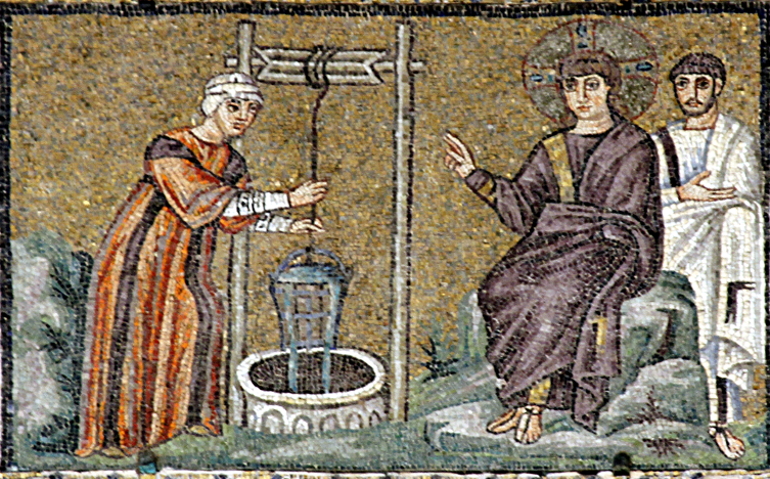
Jesus and the Samaritan woman at the well in the Basilica of Sant' Apollinare Nuovo, Ravenna, Italy. (© José Luiz Bernardes Ribeiro / CC BY-SA 4.0)
These three lessons today are very rich and powerful lessons and I hope we can pull together what they really are telling us and let it shape our lives. That question in the first lesson: Is God in our midst or not? We can understand easily how those people in the desert, suddenly in the middle of nowhere with no water to drink, could begin to wonder, why did God take them, and lead them out of Egypt? Is God in our midst or not? Well, they found out quickly. God is in our midst. God did provide the water and the food that they needed.
The Gospel lesson, especially, also teaches us God is in our midst in Jesus. During Lent, as I've mentioned before, it's important that we spend time fasting, penance, almsgiving, but especially in prayer, trying to get to know Jesus better and learn how to follow him where he wants to lead us. Today's lesson, I think, might surprise us in what Jesus is teaching us when we begin to really take this incident apart and understand it.
|
Third Sunday of Lent |
First of all, (I know it's been true for me, but probably for most of us) we've always kind of presumed that woman must have been a terrible sinner, an adulteress, probably. She has been in and out of relationships, marriage, and she doesn't seem to have a lot of confidence in God or in being able to lead a good life. But in fact, in the Greek Christian Catholic Church and the Russian Christian Catholic Church, this woman is a saint. In the Greek Church, she's St. Photine. In the Russian Church, she's St. Svetlana — the same name. It means lightbearer.
This is the genius of Jesus and why we need to listen to him carefully and watch how he acts. When he comes to the woman and he asks for that drink of water and she kind of pushes him off, "You're going to ask me for a drink? I'm a Samaritan. Jews hate Samaritans; Samaritans hate Jews." She answers brusquely and unkindly, but Jesus just takes it all in and then says to her, "Look, if you knew the water I had to give to drink, you wouldn't be asking me."
Of course she's saying, "This is water that I'll have and I'll never have to go back to this well again; I'll have water forever." But then Jesus leads her on further, carefully, to let her see that the water is not just physical water; it's the water that brings life, but not just physical life, everlasting life, the life of Jesus himself. In fact, as St. Paul in our second lesson today says, "It's the love of God poured into our hearts through the Holy Spirit who's given to us."
That love of God and the Holy Spirit makes us sons and daughters of Jesus, brothers and sisters to one another. It's the living water, that love of God. As the conversation goes on, the woman begins to understand. Probably, this woman wasn't a sinner. Like all of us, she probably committed some sins, but it's more likely in her circumstances, that she was one who had been unjustly divorced. In the Jewish law, only a man could get a divorce, not a woman. The man could put the woman out and she could do nothing about it; women had no rights.
She had been divorced five times and probably every time unjustly. It's also possible, which is even worse, that she was caught up in a situation, which is provided for in the law at that time — a concubine. If a father had a daughter that he could not support, he could sell that daughter. She would become a house slave and be a concubine. That's the kind of life she had. Jesus sees the deep goodness in this person beyond the exterior that first confronted him and he draws her along, lets her begin to see who he is, and she accepts, "Yes, you are the Messiah, the Anointed One, sent by God."
Her whole life, then, takes on a new meaning. Jesus had drawn her to himself and filled her with the grace, the love of God poured in to her heart. What does she do? She goes back to her village and she begins to proclaim the Gospel and she gets people to understand whom Jesus is. They come, they want to see, and they begin to follow him, "Stay with us." He stays for two days making more and more disciples. According to the Christian tradition of the Greek Church, Photine, this woman, became a disciple, even traveled to North Africa and established a church there.
Now there are many, many things that we can learn from these lessons. Probably the most immediate thing is that we, too, have to be open to the people we meet, not to judge, but try to see the goodness in another person as Jesus does. Most people would have just thought of her as a sinner. He sees more deeply. We, too, have to try to see in our brothers and sisters the goodness that is there in spite of that all of us fail times, but the inner, deeper goodness that we can find in one another and help to draw that forth.
But also, I think this should teach us a lesson for our church. I am sure you're all aware that we are finding ourselves in the church in a desperate need for priests. Jesus didn't hesitate to make this woman a disciple, even an apostle going out and drawing other people in. Why do we put up such barriers against women in our church? Why don't we welcome them as disciples? I often think when I celebrate Mass here and we have a brother and sister serving, people would say, "He probably could be a seminarian, become a priest."
We ought to say, "She probably could be a seminarian, become a priest." Why not? Jesus did; he drew women into the fullness of his work. It's time we listen to Jesus in that regard, too. We might go back to our original question: Is God in our midst or not? The answer is, yes, God is in our midst. We have to listen to God in the Word that we hear every week. We have to receive God into our hearts through our Eucharist.
We have to go through his life, death, and resurrection as we celebrate that Eucharist. Then we find God working within us. That love of God is poured into our hearts through the Spirit who's given to us. Then we can say, yes, God is in our midst, God is working through me, and I can help to do the work of Jesus. There should be no limits to how I do that work. I've prayed that all of us will listen deeply to what our Scriptures tell us today. Pray over these words and hope that they change our lives and change our church.
[Homily given at St. Philomena, Detroit, Michigan, March 19, 2017. The transcripts of Bishop Thomas Gumbleton's homilies are posted weekly to NCRonline.org. Sign up here to receive an email alert when the latest homily is posted.]








